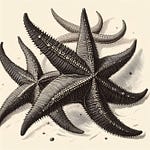It’s time for episode 4: “Zombie Pseudoscience”!
You can find a nice (not Substack-generated) transcript of the episode, as well as a music-free remix, here.
I know what you’ve been thinking (I have theory of mind, after all). You’ve been wondering, “When are they going to discuss Karl Popper? And Imre Lakatos? And goblins?” Well, in this week’s episode, we’re delighted to finally connect all this “theory of mind deficit” business with the philosophy of pseudoscience.
“Zombie Pseudoscience”
Autism research focusing on “theory of mind deficits” seems… off. As we’ve already discussed, it has suffered from repeated failures of replication, and seems to involve constantly shifting goalposts. So at this point, I’m going to go out on a limb and say that the vast majority of this research is bad science.
But what makes “theory of mind deficit” research bad science? And is it possible that this body of research has become so bad that it’s no longer science at all?
We speak with autistic philosopher of science Travis LaCroix (he/him) and neurodivergent philosopher of science Joe Gough (he/him) about the nature of bad science, when bad science becomes pseudoscience, and how bad science can become a zombie that just won’t die.
Topics Discussed
Quick recap. (00:30)
The “theory of mind deficit” view of autism seemed to become an unfalsifiable theory over time. (02:39)
Why it’s important for scientific theories (at least in quantitative research) to be falsifiable. (03:41)
Amelia’s sleepy invisible goblin theory. (03:54)
Karl Popper: good scientific theories must be falsifiable. (06:47)
The “theory of mind deficit” view of autism started off as a falsifiable theory, but became unfalsifiable over time. So, it’s not exactly like the sleepy invisible goblin theory; it’s more analogous to the flat-earth conspiracy theory. (07:07)
Travis’s introduction. (10:10)
Travis explains why we can’t simply use Popper’s falsifiability criterion to explain why “theory of mind deficit” research is bad science. Historical example: the precession of the perihelion of Mercury. (11:06)
Travis explains why Imre Lakatos rejected Popper’s falsifiability criterion. According to Lakatos, scientists should not immediately reject a theory when it makes inaccurate predictions. (15:13)
According to Lakatos, a research program contains a “hard core” as well as “auxiliarity hypotheses.” When a research program makes bad predictions, scientists should tinker with their auxiliary hypotheses first, and only abandon the hard core as a last resort. (15:45)
According to Lakatos, it’s time to abandon the “hard core” of a research program when the research program degenerates. A research program degenerates when it ceases to make novel predictions, or when it stops making accurate predictions (in spite of tinkering with auxiliary hypotheses). (18:48)
Travis thinks “theory of mind deficit” research is a degenerating research program. (19:47)
Gernsbacher and Yergeau demonstrate that the “theory of mind deficit” view of autism is a bad auxiliary hypothesis. (20:13)
Why Travis thinks “theory of mind deficit” research has degenerated to the point of being pseudoscience . (22:21)
It’s often not clear what “theory of mind” means. Different researchers measure it in totally different ways. (24:36)
Joe’s introduction. (25:17)
“Theory of mind” in autism research: reasoning explicitly about the mental states of other people disqualifies you from having “good theory of mind.” (26:24)
“Theory of mind” in animal psychology: reasoning explicitly about the mental states of others is essential for having “good theory of mind.” (28:14)
Cross-talk about theory of mind in autism research and in animal psychology dehumanizes autistic people, by creating a (misleading) link between autistic people and non-human animals. (30:02)
“Theory of mind” pops up all over psychology. Is any of this research salvageable? (31:54)
Joe thinks researchers need to get rid of the concept of “theory of mind.” (33:16)
According to Joe, “theory of mind” research isn’t much methodologically worse than other types of psychological research. But in autism research focusing on theory of mind deficits, the moral stakes are high—and that makes the normal level of “messiness” in psychology unacceptable. (33:46)
Why Joe thinks that the “theory of mind deficit” view of autism is no longer a real theory; it’s more like a bad summary. (34:49)
The origin of that bad summary? Stigma, and perverse institutional incentives. (36:07)
Where Joe thinks “theory of mind” research is going—and where he thinks it should go. (37:54)
Look-ahead to episode 5. (39:08)
Sources Mentioned
Karl Popper, Logik der Forschung: Zur Erkenntnistheorie der modernen Naturwissenschaft (1934). Translated into English in 1959 under the title The Logic of Scientific Discovery. http://philotextes.info/spip/IMG/pdf/popper-logic-scientific-discovery.pdf
Imre Lakatos, “Falsification and the Methodology of Scientific Research Programmes” in Criticism and the Growth of Knowledge (1970). Republished in The Methodology of Scientific Research Programmes (Philosophical Papers: Volume 1) (1978). http://www.csun.edu/~vcsoc00i/classes/s497f09/s690s08/Lakatos.pdf
Travis LaCroix, “Autism and the Pseudoscience of Mind”: http://philsci-archive.pitt.edu/22817/
Joe Gough, “The many theories of mind: eliminativism and pluralism in context,” Synthese, Volume 200, Number 4 (2022). https://www.researchgate.net/publication/361904137_The_many_theories_of_mind_eliminativism_and_pluralism_in_context
Papers in which researchers claim that autistic people “hack out” answers to (i.e., cheat on) theory of mind tests, include:
Frith, Happé, and Siddons, “Autism and theory of mind in everyday life,” Social Development, Volume 3 (1994), pp. 108-124.
Happé:
“An advanced test of theory of mind: Understanding of story characters’ thoughts and feelings by able autistic, mentally handicapped, and normal children and adults.” Journal of Autism and Developmental Disorders, Volume 24 (1994), pp. 129-154.
“Annotation: Current psychological theories of autism: The “theory of mind” account and rival theories.” Journal of Child Psychology and Psychiatry, and Allied Disciplines, Volume 35 (1994), pp. 215-229.
“The role of age and verbal ability in the theory of mind task performance of subjects with autism.” Child Development, Volume 66 (1995), pp. 843-855.
Baron-Cohen, “The hyper-systemizing, assortative mating theory of autism,” Progress in Neuro-Psychopharmacology and Biological Psychiatry, Volume 30 (2006), 865-872.
For an example of “the logical problem” in animal mind-reading, see Penn and Povinelli, “On the Lack of Evidence that Non-Human Animals Possess Anything Remotely Resembling a ‘Theory of Mind’.” Philosophical Transactions of the Royal Society, B 362 (2007), pp. 731-744.
Joe says, “Much higher stakes means a higher evidential bar, that seems like just part of doing science responsibly.” For more on this idea, I suggest reading work by the philosopher of science Heather Douglas. For example, see her paper “The Role of Values in Expert Reasoning,” Public Affairs Quarterly, Volume 22, Number 1 (January 2008).
Credits
Hosting, Research, Fact-Checking, Script-Editing: Amelia Hicks and Joanna Lawson
Guests: Travis LaCroix and Joe Gough
Music and Audio Production: Amelia Hicks
Thank-Yous
Many thanks to Travis LaCroix and Joe Gough for speaking with us about bad science, pseudoscience, and “theory of mind deficit” research! Be sure to take a look at Travis’s new paper about autism pseudoscience and theory of mind, as well as other neat projects associated with his new grant, titled “Philosophy on the Spectrum”: https://autphi.github.io/about/. Also, over the next three years, Joe will be researching legal and medical assessments of decision-making capacity, and how those assessments misfire for neurodivergent and cognitively disabled people—I’m really looking forward to seeing the work that comes out of that post-doc.
And thanks to the Marc Sanders Foundation and the Templeton Foundation for their support of the show.












Share this post